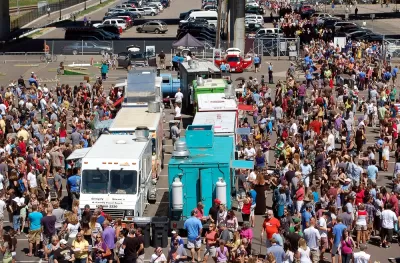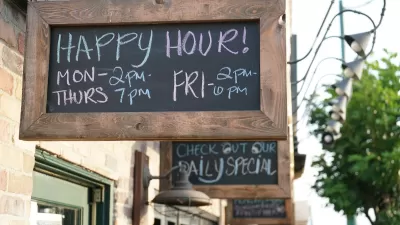Downtown property owners are clashing with food truck operators over where the latter should park their businesses.

As mobile merchants, food trucks encounter practical and regulatory questions that neither other vehicles nor other vendors contend with. Now Minneapolis is trying to balance the needs of food trucks and property owners in its Downtown area.
Property owners want to limit the number of trucks that can operate in the same area. But food truck operators say business is best when they vend together, creating a "destination." They also want to expand the areas they can operate in, as well as the hours, to serve people leaving bars at closing time.
The city, according to MinnPost, comes down in the middle. It amended a local ordinance on food trucks in January—imposing some restrictions and removing others.
Some regulations are there for safety: Trucks can’t park in a space with a bike lane between it and the curb, which would put moving cyclists between the truck and the customer on the sidewalk.
Others—like prohibiting trucks from operating near fairs, parks, or sports stadiums—protect brick-and-mortar vendors from competition.
Though property owners say City Hall is soft on food trucks because of their popularity, the reporter says both mobile and stationary eateries appear to be thriving.
FULL STORY: Does Minneapolis have too many — or too few — rules governing food trucks?

Alabama: Trump Terminates Settlements for Black Communities Harmed By Raw Sewage
Trump deemed the landmark civil rights agreement “illegal DEI and environmental justice policy.”

Planetizen Federal Action Tracker
A weekly monitor of how Trump’s orders and actions are impacting planners and planning in America.

The 120 Year Old Tiny Home Villages That Sheltered San Francisco’s Earthquake Refugees
More than a century ago, San Francisco mobilized to house thousands of residents displaced by the 1906 earthquake. Could their strategy offer a model for the present?

In Both Crashes and Crime, Public Transportation is Far Safer than Driving
Contrary to popular assumptions, public transportation has far lower crash and crime rates than automobile travel. For safer communities, improve and encourage transit travel.

Report: Zoning Reforms Should Complement Nashville’s Ambitious Transit Plan
Without reform, restrictive zoning codes will limit the impact of the city’s planned transit expansion and could exclude some of the residents who depend on transit the most.

Judge Orders Release of Frozen IRA, IIJA Funding
The decision is a victory for environmental groups who charged that freezing funds for critical infrastructure and disaster response programs caused “real and irreparable harm” to communities.
Urban Design for Planners 1: Software Tools
This six-course series explores essential urban design concepts using open source software and equips planners with the tools they need to participate fully in the urban design process.
Planning for Universal Design
Learn the tools for implementing Universal Design in planning regulations.
Clanton & Associates, Inc.
Jessamine County Fiscal Court
Institute for Housing and Urban Development Studies (IHS)
City of Grandview
Harvard GSD Executive Education
Toledo-Lucas County Plan Commissions
Salt Lake City
NYU Wagner Graduate School of Public Service





























